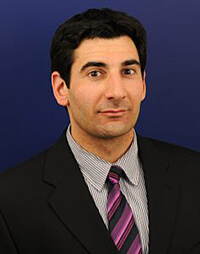April 25, 2017
Three engineering faculty receive 2017 NSF CAREER awards
 Joyce Main
Joyce Main
WEST LAFAYETTE, Ind. – Three Purdue University faculty members in the College of Engineering won 2017 Faculty Early Career Development awards from the National Science Foundation, one of the most prestigious NSF honors for outstanding young researchers.
The NSF issued awards to 156 Early Career researchers as part of the NSF Engineering Directorate. Purdue’s recipients were: Joyce Main, Shreyas Sundaram and Michael Sangid.
Modeling the Longitudinal Career Pathways of Engineering Doctorates by Gender, Race/Ethnicity, and Discipline
Main, an assistant professor in the School of Engineering Education, is principal investigator of an integrated research and education project examining how individual factors, institutional structures and environmental contexts converge at the Ph.D. level to model and explain the longitudinal career patterns of engineering Ph.D.s. By examining whether there are differences in career paths by gender, race/ethnicity, and engineering discipline, this research project will render important contextual information for various applications, such as the creation of engineering workforce policy, development of strategies that promote a competitive engineering workforce, and ways of strengthening academic-industry partnerships. The findings will provide doctoral programs with critical and actionable information for developing and enhancing training that accounts for the realities of workforce demands and student career preferences.
Her NSF award description is available at https://www.nsf.gov/awardsearch/showAward?AWD_ID=1653378&HistoricalAwards=false
 Shreyas Sundaram
Shreyas Sundaram
Toward Secure Large-Scale Networked Systems: Resilient Distributed Algorithms for Coordination in Networks under Cyber Attacks
Sundaram, assistant professor of electrical and computer engineering, will research the problem of large-scale networked systems under threat from sophisticated cyber-attacks that can compromise some of the components and cause them to behave erratically or inject malicious information into the network. The proposed research will lead to a greater understanding of the fundamental factors that affect the resilience of distributed optimization, learning, and estimation dynamics, and establish systematic procedures to design large-scale networked systems that are capable of operating in a near-optimal manner under attacks. Given the lack of existing work on this topic, the research will lay the groundwork for substantial further explorations of resilient algorithms for distributed decision-making and coordination in large-scale networks.
His NSF award description is available at https://www.nsf.gov/awardsearch/showAward?AWD_ID=1653648&HistoricalAwards=false
 Michael Sangid
Michael Sangid
Understanding Grain Level Residual Stresses Through Concurrent Modeling and Experiments
Sangid, an assistant professor of aeronautical and astronautical engineering with a courtesy appointment in materials engineering, is principal investigator on a project studying residual stresses on polycrystalline materials. The materials such as metals, alloys and ceramics dominate the infrastructure of modern society in terms of both tons of raw material usage and in the breadth of applications, which span energy, transportation, defense, and other sectors. Stresses introduced during the processing of these materials, known as residual stresses, are ubiquitous in all materials and can have tremendous effects on performance. The research will lead to the development of a computational framework to account for residual stresses and faithfully predict their distributions. The results will unequivocally elucidate the role of residual stresses across length scales in polycrystalline materials, in order to develop more accurate lifetime predictions of the alloys and fabricate tailored components that offer either minimal or beneficial residual stresses and therefore are more resistant to failures.
His NSF award description is available at https://www.nsf.gov/awardsearch/showAward?AWD_ID=1651956&HistoricalAwards=false
Writer: Brian L. Huchel, 765-494-2084, bhuchel@purdue.edu
Sources: Joyce Main, 765-496-6052, jmain@purdue.edu
Shreyas Sundaram, 765-496-0406, sundara2@purdue.edu
Michael Sangid, 765-494-0146, msangid@purdue.edu

